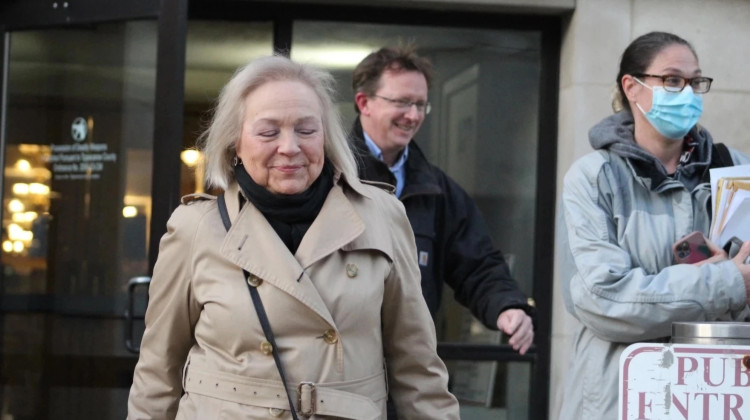
Karen Celestino-Horseman (left), Jennifer Teising (right), and reporter Dave Bangert (back) leaving court during Teising’s bench trial.
FILE PHOTO: WFYI News/Ben ThorpEarlier this month the Indiana Supreme Court vacated a case against former Wabash Township Trustee Jennifer Teising, saying that she should not have faced criminal charges.
WFYI’s Ben Thorp sat down with Lafayette reporter Dave Bangert to discuss the case against Teising, and what the case says about residency requirements for elected officials.
You can find Bangert’s coverage of Lafayette and Jennifer Teising’s case right here.
Ben Thorp: Dave, we reached out to you because you have been covering this from the start. And I want to start with former Wabash township trustee Jennifer Teising. She was indicted in early 2021 on multiple theft charges for taking her trustee salary, while allegedly no longer living within the township. What led up to that initial indictment?
Dave Bangert: Well, it really goes back to the elections in 2018. We had kind of a mini blue wave here in town and she was part of that. When COVID hit she started apparently traveling around… she had sold her house, started moving in with friends and living in their driveways, in other parts of the state and in Florida and other places. People started wondering where she was.
Thorp: Teising was initially found guilty on all counts in early 2022. With Judge Kristen McVey writing that Teising forfeited her position because of how much time she spent outside the township. Maybe you can talk about one of the outstanding questions of that trial, which, at least for me, was what requirements are there under state law for an elected official to live within the area that they represent?
Bangert: In court they used cell phone records to track the fact that she was only here a handful of days over the course of about six months. But that was the question… what does it mean to reside somewhere? When does vacation mean that you don't live somewhere?
And the fact that she was claiming to still do her work, she was still in touch with her assistant at the township. So there was a lot in court about whether she had intent to leave or didn't have intent to leave. And the judge ruled that - it was a bench trial, three days - she took about three weeks to rule and said, 'Yes, she was not a resident.' So this was theft.
Thorp: When the Indiana Court of Appeals overturned Teising’s guilty verdict late in 2022, they argued that the state had not provided enough evidence that Teising planned to vacate her Wabash township residents and live elsewhere. The more recent Indiana Supreme Court decision went a step further, and said that the state failed to provide proof of any criminal intent at all.
Maybe it's worth asking what you think the ripple effects of this case might be? Obviously, you know, we've seen changes to state law, but this question feels like it's still out there about residency, and what does it mean to be a resident of a place that you represent?
Bangert: Many people here are really hyper vigilant about it, you see more challenges of candidates before they run. That's been kind of a following thing. We had another trustee who was in trouble for completely different kinds of theft questions, and not residency.
But I think the residency thing will continue here, I think it'll just keep coming up in some fashion. And a part of their argument for Jennifer Teising was that in a modern day, you don't have to live someplace to do the work, in an age of remote offices and remote employees, a trustee could do the work. So it made it a little more complicated.
I think everybody wanted the Supreme Court to at least address that. I think also, if you talk about the following two years… almost three years later, from really the heat of all this, a lot of people have wanted to move on. I actually heard that quite a bit after I wrote about it.
You know, she's back in the news again. I think people had some lingering bad taste in their mouth of the whole thing and thought maybe this will go away. But for her, it means that she doesn't go to jail.
Thorp: Thank you so much for taking the time to talk to us.
Bangert: Sure.
 DONATE
DONATE






 Support WFYI. We can't do it without you.
Support WFYI. We can't do it without you.